Why is my cockatiel drooling? It isn’t typical for any sort of liquid to be running from a parrot mouth, they will require consideration from a vet ASAP. The most well-known reason for what resembles slobbering in wild feathered creatures is a condition called an ulcer.
The condition causes sores in the throat, windpipe, and inside the snout and can taint the sinuses as well. It is ordinarily found in pigeons, garden feathered creatures, and fowls of prey.
The condition itself isn’t perilous, yet it prevents the winged creature from gulping or breathing and the fledgling ultimately starves or chokes to death. It ordinarily is encircled by an extreme disease of the delicate tissues, which once more, can death of the feathered creature.
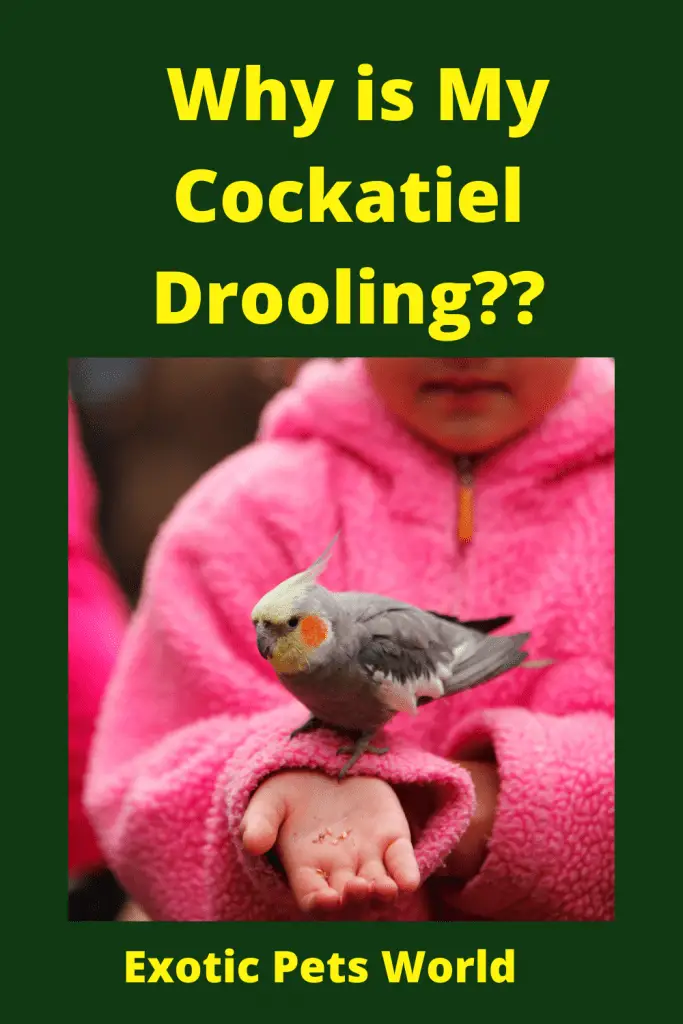
Why is My Cockatiel Drooling? Symptoms?
Cockatiels cover their disease for as long as could be expected under the circumstances. This implies, when you see them not behaving well, you should quickly take them to an aviary veterinarian specialist, avian vet. It implies their ailment is serious, so don’t fool around.
The critical side effects of drooling cockatiels being sick: any of these indications appear, you should take your Cockatiel to the vet right away.
16 Symptoms for Drooling Cockatiels
- Loss of craving
- Not moving around
- Not talking or peeping
- They look drained
- They don’t drink or drink much more than they ought to
- They get thinner
- Their mouths are stained
- They hang their head
- They begin losing their plumes, or they begin overplucking their quills
- They look perplexed; they don’t act like they normally do.
- They don’t rest as they for the most part do.
- They fold their head under the care of them or lay down with eyes half-open.
- Dying
- Swollen eyes
- Plumes looking irregular
- Breath issues and regurgitating
- Drool
- Opening of Beak
Cockatiels are little winged creatures; if they can’t eat or don’t eat in light of disease, this can truly quickly become serious, inside a matter of a couple of days as it were. A few cockatiels are being overbred and accordingly have hereditary issues. Draining and wounds can be the indications of this, however, a vet will have the option to affirm this to you rapidly. Tame Pet cockatiel feathered creatures can undoubtedly acquire this.
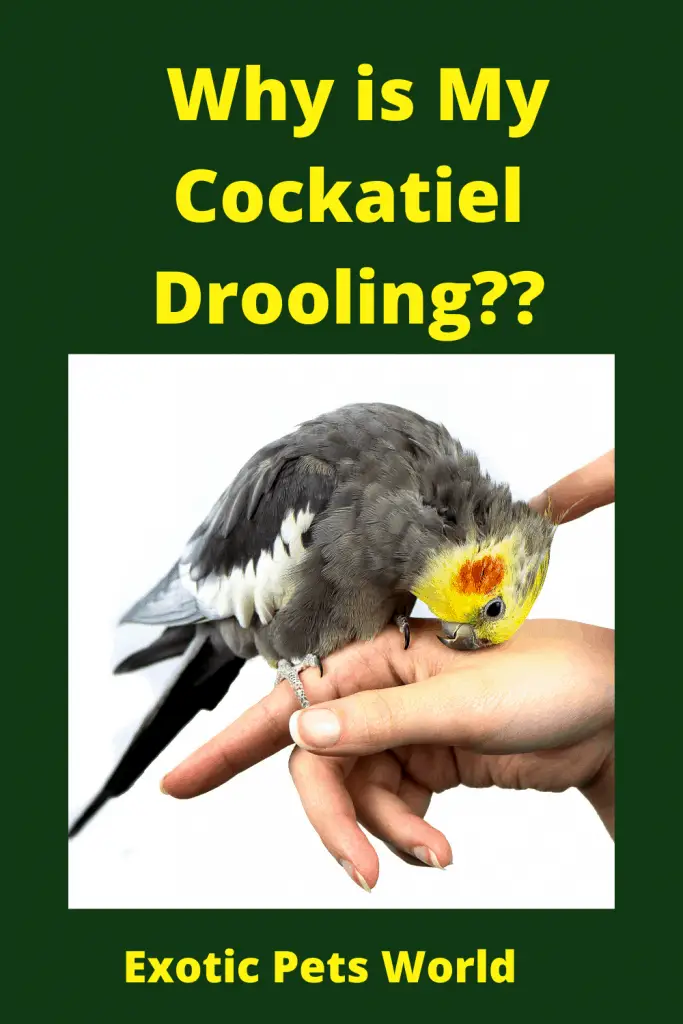
Why is my Cockatiel Opening its Mouth?
Cockatiels can’t perspire and hence they inhale vigorously to remove heat from their bodies. The warm air is delivered and cooler air is breathed in. This gasping is profoundly powerful for chilling the fledgling’s body off.
Different reasons a cockatiel may open its mouth incorporate yawing, sniffling, trilling, or whistling. These practices are ordinary and there is no compelling reason to worry.
Is it OK to Kiss a Cockatiel?
At the point when you state “kiss,” I am assuming you mean a brisk peck on the bill or head or such. There is no issue from your standpoint,, yet human spit and mouth germs can be perilous to flying creatures so you need to ensure you keep within your mouth away from them.
A few winged creatures (parrots) like individuals’ teeth for reasons unknown! Try not to allow your winged creature to play dental specialist! And peck at your teeth.
Realize that pecking, s if you know as a matter of fact that they don’t nibble as a sign of affection when you kiss them.
How Can I Treat a Sick Cockatiel at Home?
While sick flying creatures can periodically be treated by their proprietors at home, any cockatiel giving indications of ailment ought to be analyzed by a veterinarian.
Flying creatures that gravely ill require hospitalization, while those that are as yet eating or that are just somewhat, might be treated by their owners under their veterinarian’s advice. On the off chance that you are sedating your debilitated winged animal at home as per your veterinarian’s directions, these tips may give you a few hints to assist with your flying creature’s recuperation.
- Give all prescriptions as coordinated
- Keep your pet winged creature warm
- Try not to change your fledgling’s rest cycle
- Ensure your fledgling eats and drinks
- Have Water available
- Calm Quiet Environment.
- Separate sick Cockatiel from other birds.
- Advise your doctor on the off chance that you become sick
- Advise your veterinarian if your fledgling’s condition deteriorates
What are the Signs of a Sick Cockatiel?
In the wild, winged creatures like cockatiels don’t give indications of sickness. . At home, nonetheless, It is easy to spot and you are able to react. To ensure your cockatiel is sound, observe any changes in behavior, character, action, or actual health.
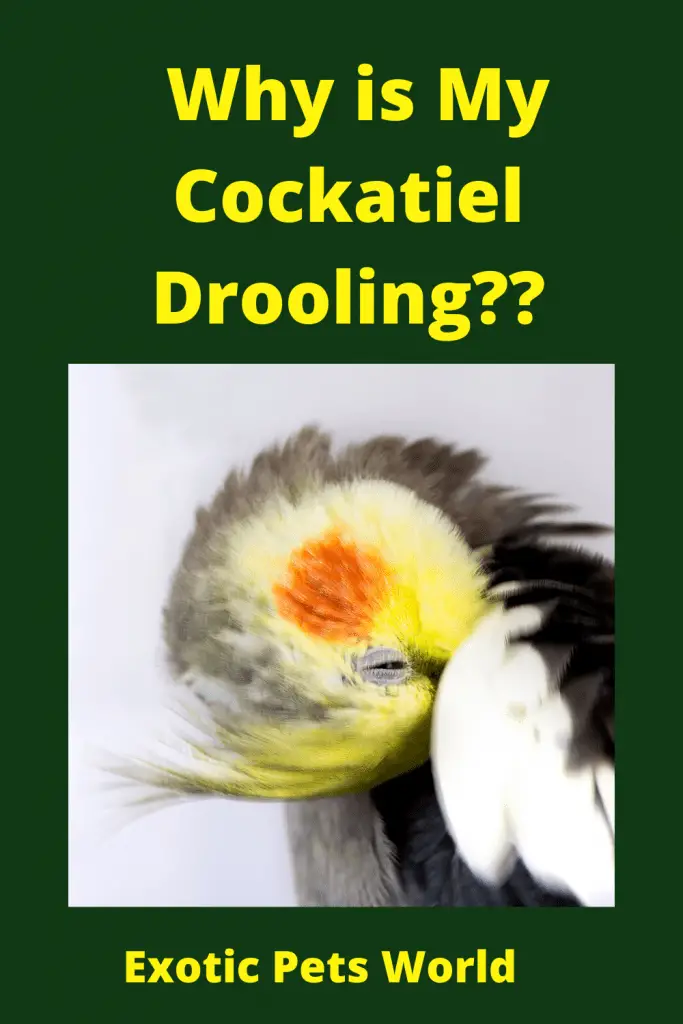
There are Three Techniques
Technique 1
Distinguishing changes in behavior
Note changes in behavior. . Cockatiels are normally dynamic winged creatures. They are known to be social and inquisitive. Since fowls tend not to give indications of sickness until they are exceptionally sick, it is imperative to know your cockatiel’s ordinary health and practices when it is healthy. . In the case of anything changes, be on the alarm
- Notice their activity levels. An abrupt drop in movement may imply that the winged animal isn’t feeling well, or getting better. Watch how dynamic or fiery your winged animal is. A few indications of lethargy include
- Sitting or lying on the lower part of the enclosure.
- Powerlessness to fly or exercise.
- Resting for extensive periods.
- Overlooking you on the off chance that they are ordinarily social.
- Overlooking sounds or development around them.
- Sitting on a roost with their plumes cushioned up.
- Tune in to their twittering for any changes. Any adjustments in the sound or tone of their voice may demonstrate an issue whenever joined by different manifestations. This could incorporate loss of voice, crying often, failure to sing, or a frail nature of voice.
- See how they rest. As a rule, cockatiels lay down with one foot raised into their quills. If your cockatiel is unexpectedly laying down with the two feet holding the roost, counsel a vet.
- Focus on the amount they are eating. Changes in hunger are one of the vital side effects of disorder in cockatiels. On the off chance that the winged creature is either eating pretty well, more than expected, take them to a vet.
- Changes in food or stress can likewise mess eating up. On the off chance that the cockatiel is feeling ill, the deficiency of craving will be joined by different indications.
Technique 2
Investigate their quills for any indications of outside problems.
Raised a ruckus perhaps the most regular indications of disease in cockatiels. Loss of quills, especially around the feet or eyes, can likewise flag a problem.
Sometimes flying creatures will cull their quills. This may be because of infection, stress, or tension. Treat these issues ahead of schedule to forestall enduring issues.
While cockatiels may lighten up their plumes while resting, their quills ought not to be puffed up throughout the day.
On the off chance that they are doing this for extensive stretches, take them to a vet.
- Conjunctivitis (otherwise called pink eye) is a typical sickness in cockatiels.
- Loss of plumes around their eyes can be an indication that they have bugs.
Check their Droppings to Check Whether they have Stomach Related Issues
Healthy feathered creature droppings comprise of snaked earthy colored defecation, powdery white urates, and clear, fluid pee. Change in shading, consistency, or recurrence of droppings may imply that the cockatiel isn’t feeling well. Search for:
- An absence of pee
- Watery defecation or urates
- Loose bowels
- Yellow, green, red, or dark shading
- Undigested food in their droppings
- Not Drinking Water
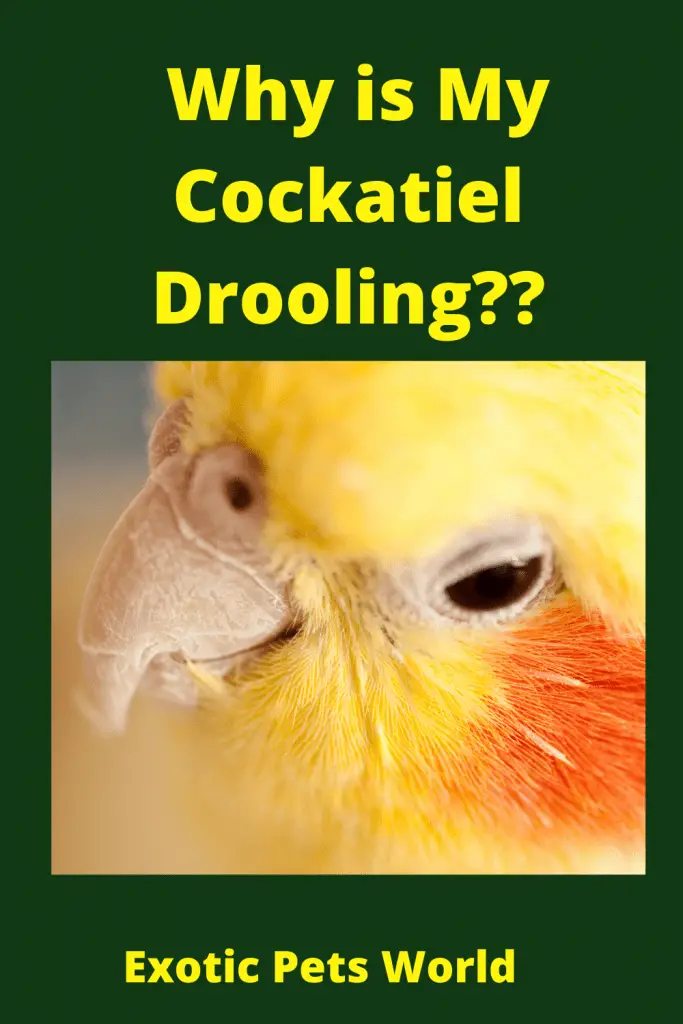
Investigate Their Bill for Discharge, Cracks, Broken.
Their nose ought to be straight, smooth, and even. Any abnormality or chipping of the bill may demonstrate issues. You ought to likewise check for any release or crusting around the snout or nostrils.
Have a go at giving the cockatiel a seed to perceive how well they can eat it. If they have difficulty and struggle to eat it, they need to see a vet.
Listen to their breathing, for indications of respiratory issues, difficulty, loud labored noises.
On the off chance that the cockatiel is struggling to inhale, they may have a respiratory issue.
Listen cautiously for any wheezing, panting, clicking, or substantial relaxing. They ought not to inhale with their mouth open.
Check the Vent for Indications
Signs of looseness of the bowels. The vent of the cockatiel is the place where they remove their waste. It is on their base side just underneath the tail. A healthy solid vent is spotless and dry. On the off chance that the plumes are unsettled, glued, or wet, the cockatiel may have the runs.
Technique 3
Getting a Diagnosis
Visit an avian veterinarian
Diseases can advance rapidly in feathered creatures. Take your feathered creature to a vet at the earliest opportunity on the off chance that you are worried about their wellbeing. It is ideal to take your cockatiel to an avian veterinarian, which is a vet that represents considerable authority in birds.
The Association of Avian Veterinarians has an information base where you can look into nearby avian vets.
You can likewise inquire as to whether they are aware of any avian experts close to you.
Report any side effects.
Notwithstanding the conduct and actual changes that you have seen, tell your vet of some other side effects of the disorder. These include
- Weight reduction
- Heaving
- Loose bowels
- Seizures
- Sniffling
- Any indications of blood
- The picture named Spot Signs of Illness in a Cockatiel
Permit the vet to perform tests
If the vet speculates that the cockatiel is sick, they may do various tests. They may have to keep your flying creature at their office while they do these tests. Some normal tests include
- Bloodwork
- Fecal tests
- Viral screening
- X-beams
- Psittacosis Testing
- Contagious testing
How do you Comfort a Dying Cockatiel?
It seems as if his whole framework is gradually closing down. He’s underweight by around 30 g and he’s experiencing difficulty thermos regulating. On the off chance that his end is close, the best anyone can hope for at this point is to give comfort. In one way or another add some warmth close by so he doesn’t feel so chilled. Give him simply to process food that he prefers.
What is Lutino Cockatiel Syndrome?
Changing color Diseases. Lutino Cinnamon Cockatiel is a result of two shading varieties, lutino, which makes no dark melanin be formed. Cinnamon, which adjusts the melanin granules to a mind-boggling design that arises earthy colored. This cockatiel change is identified with the regular with dark patches supplanted by tan to cinnamon earthy colored tone.
Conclusion
If Your Cockatiel is drooling, change of eating habits, your bird is having feather or bowel issues. It is a sign that there is something wrong. Your first thing would be to contract your Avairy Veterinarian, (Avian Vet) At least by call or visit. That way you can head off if his health difficulty is serious.
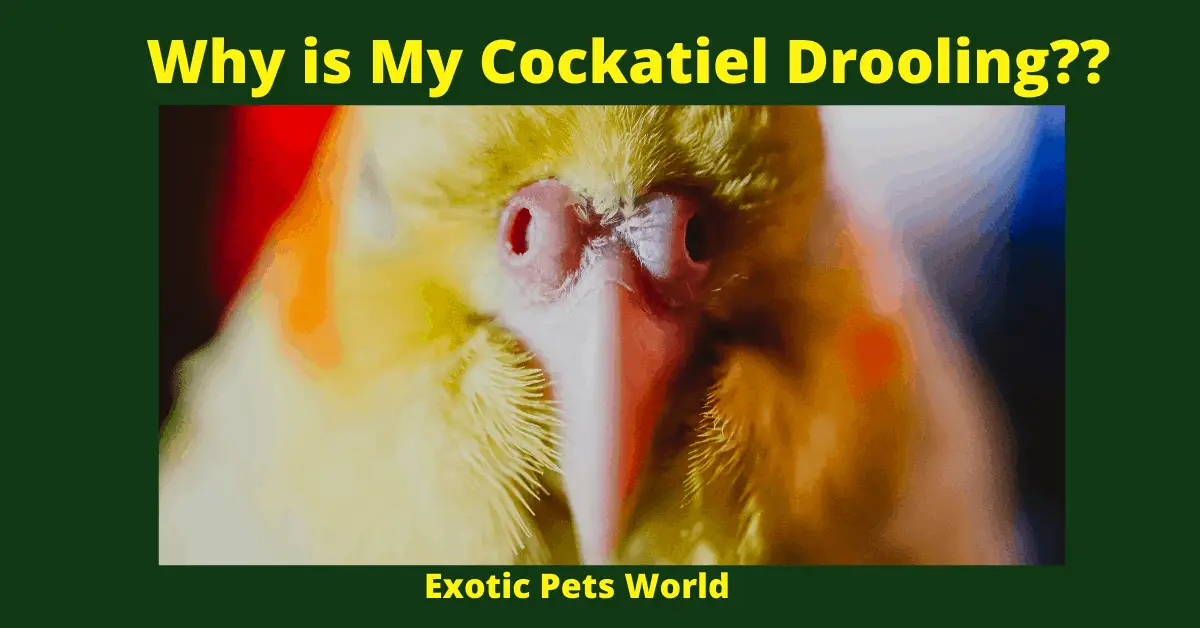

Can you be more specific about the content of your article? After reading it, I still have some doubts. Hope you can help me.
This is a topic that’s near to my heart… Best wishes! Where
are your contact details though?
Very nice post. I just stumbled upon your blog and wanted to say that I’ve truly enjoyed surfing around your
blog posts. In any case I will be subscribing to your feed and I hope you
write again soon!
I have observed that in the world these days, video games would be the latest trend with children of all ages. Many times it may be out of the question to drag young kids away from the games. If you want the very best of both worlds, there are plenty of educational video games for kids. Thanks for your post.
Have you ever considered about adding a little bit more than just your articles?
I mean, what you say is important and everything. However imagine if you added some great pictures or
videos to give your posts more, “pop”! Your content is excellent but with images and
videos, this blog could undeniably be one of the
most beneficial in its niche. Awesome blog!
It’s not my first time to go to see this site, i am visiting this web site dailly and get
good information from here every day.
I loved as much as you’ll receive carried out right here.
The sketch is attractive, your authored subject matter stylish.
nonetheless, you command get bought an shakiness over that you wish
be delivering the following. unwell unquestionably come further formerly again since exactly
the same nearly very often inside case you shield this hike.
Very interesting subject, regards for posting.Expand blog